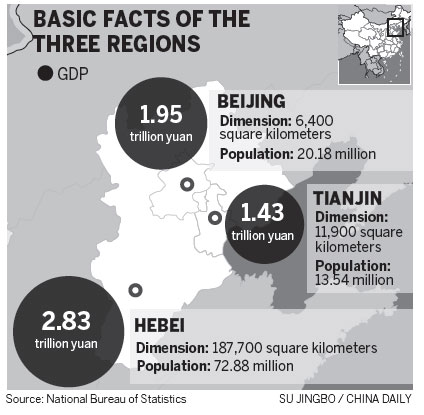The building of an integrated economic zone around Bohai Bay may bring huge benefits to the region but will also require intensive effort, said Tianjin's vice-mayor.
Zong Guoying, who is also head of the Binhai New Area, voiced his concerns about the implementation of the national strategy to build a trilateral hub in the Bohai Bay area that covers Beijing, Tianjin and Hebei province.
Zong told China Securities Journal the cooperation of the two municipalities and the province requires much more work than many expect. "It's not just about holding several symposiums or signing some cooperative agreements," he said.
The issue has gone beyond the purely economic sphere and is not just a matter of the three provincial areas being involved. It has become a political issue that will influence the whole Bohai Bay area, he told the Beijing-based newspaper.
The Bohai Bay area is considered China's third economic engine, alongside the Pearl and Yangtze river deltas.
Development of the area has been discussed by the central government since the 1980s. China's State Council set up a working group in 2004 to draft a development plan but the strategy has been on the shelf since then.
The new leadership restarted the initiative in late February, when Chinese President Xi Jinping, who is also head of the leading group for overall reform, held a symposium in Beijing on the coordinated development of the capital and its two neighbors. He paid several trips to the two areas last year.
A statement released after Xi's symposium said the coordination of development among the three areas focuses on optimizing the industrial layout and improving the allocation of resources. In addition, the three areas will promote logistics, industrial complementation and environmental protection, it said.
Tianjin, a port city with a population of 14 million, is linked to Beijing by several highways and a 30-minute trip by high-speed railway. Hebei, with about 73 million residents, surrounds Beijing and Tianjin, and is a traditional industrial and transportation hub.
"The initiative has progressed in recent years. The three places signed cooperative agreements on different areas, but Xi's symposium really got the ball rolling," Zong said.
Tianjin and Hebei set up a bilateral coordination group that holds monthly meetings to break institutional barriers and carry out exchanges in a smooth and timely manner.
As Zong admitted, the coordinated development of the three areas requires regional planning that transcends administrative boundaries. "Tianjin and Hebei may have to adjust their original target to better fit the current model in coordinated regional development," he said.
The integration of harbors, which has been a long-standing obstacle hindering regional incorporation, is certainly one of the items that requires a breakthrough.
While Tianjin is striving to build itself into an "international shipping center", as the State Council has required of it, Hebei is also quickly catching up with the construction of ports and trying to seize as much market share as possible.
Caofeidian, Hebei's most important port, is set to overtake Tianjin in terms of deepwater berths. It is also offering larger storage space at a lower price to lure more ships from Tianjin, which currently ranks as the fourth largest port in the world.
Yang Kaizhong, a professor at the Chinese Academy of Governance, said both Tianjin and Hebei province rely heavily on port economics in local development so coordinated development of the region means the function of these ports must be integrated.
"It means, to some extent, some local interests have to be sacrificed for the development of the whole area," he said.
"In addition, more favorable policies that can promote public facilities should be handed over to Tianjin and Hebei because some industries and laborers are expected to be transferred to those two areas, increasing the burden (on infrastructure)."
Among all the problems that must addressed before the three areas can be genuinely integrated, Zong said he considers regional interconnection as the one that needs the most urgent effort.
"It is the premise on which everything else is based," he said.






